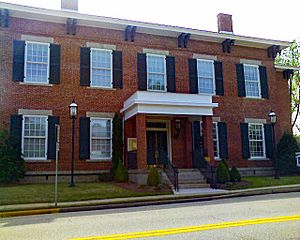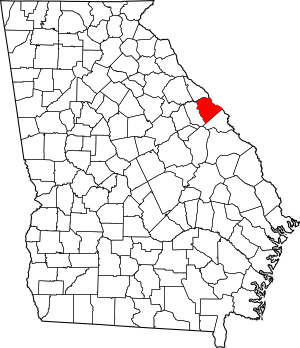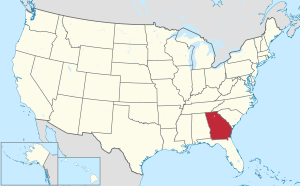Columbia County, Georgia facts for kids
Quick facts for kids
Columbia County
|
||
|---|---|---|

Columbia County Courthouse in Appling
|
||
|
||

Location within the U.S. state of Georgia
|
||
 Georgia's location within the U.S. |
||
| Country | ||
| State | ||
| Founded | 1790 | |
| Named for | Christopher Columbus | |
| Seat | Appling (de jure) Evans (de facto) |
|
| Largest community | Martinez | |
| Area | ||
| • Total | 308 sq mi (800 km2) | |
| • Land | 290 sq mi (800 km2) | |
| • Water | 18 sq mi (50 km2) 5.7%% | |
| Population
(2020)
|
||
| • Total | 156,010 | |
| • Density | 538/sq mi (208/km2) | |
| Time zone | UTC−5 (Eastern) | |
| • Summer (DST) | UTC−4 (EDT) | |
| Congressional district | 12th | |
Columbia County is a county in the east central part of Georgia, USA. In 2020, about 156,010 people lived here. The official county seat is Appling. However, the main government offices are in Evans.
Columbia County is part of the larger Augusta-Richmond County metropolitan area. It is located right along the Savannah River.
Contents
History of Columbia County
Columbia County was the 12th county created in Georgia. It was formed on December 10, 1790. This happened when a part of Richmond County was used to create the new county.
Early Times and Colonial Life
For thousands of years, different groups of Native Americans lived along the Savannah River. These included the Creek, Yuchi, and Cherokee tribes. One of the oldest places in the country where pottery has been found is on Stallings Island.
During the time when Georgia was a British colony, people started settling in the area. Many colonists came from Augusta, which was the second city in Georgia. The area became known as St. Paul's Parish in 1755. Some early settlements were Augusta, Wrightsboro (a Quaker settlement), and Brownsborough. Scots people settled Brownsborough.
In 1772, Daniel Marshall started the Kiokee Baptist Church. This was the first Baptist church in Georgia. He was arrested for preaching, but Baptist churches grew. They became very important in the South, including for enslaved and free Black people.
The American Revolutionary War
During the American Revolutionary War, two small battles happened in what would become Columbia County. These fights were between American Patriot soldiers and Tories (people loyal to Britain). The area was a frontier and people had different loyalties.
Important figures who signed the Declaration of Independence or helped create the U.S. Constitution lived here. These included George Walton, William Few, and Abraham Baldwin.
How Columbia County Was Formed
After the American Revolution, many people from Virginia and North Carolina moved to this area. People argued about whether Augusta or Brownsborough should be the main town for Richmond County. So, a new county was created from Richmond County. It was named "Columbia" after a poetic name for America.
But the arguments about the county seat continued! People built one courthouse in Brownsborough and another in Cobbham. The Cobbham courthouse was used, and Brownsborough soon disappeared. Later, in 1793, parts of Columbia County and Wilkes County were used to form Warren County.
Around 1799, William Appling gave land for a courthouse near Kiokee Creek. A town grew around it, called "Columbia Courthouse." In 1816, this town became the Town of Appling. It was named after the Appling family and Colonel John Appling, a local hero.
The Early 1800s
Appling was a very important center for politics, education, and social life. Famous schools like Mt. Carmel Academy were near Appling. Important leaders like John C. Calhoun and William H. Crawford studied there.
In the 1830s, big projects like the Georgia Railroad were built. The judges in Appling didn't want trains disturbing their court, so the railroad line was built away from the town. The Augusta Canal was also built, starting in Columbia County.
The American Civil War
Before the American Civil War, the county's economy relied heavily on large farms called plantations. These farms used the labor of enslaved people. Cotton farming grew a lot after the invention of the cotton gin. Thousands of enslaved people were brought to the county. Sometimes, there were more enslaved people than free white people.
When Georgia left the United States, George W. Crawford, who was from Columbia County, led the meeting to decide this. Men from the county joined the Confederate army. No battles happened in Columbia County during the war.
The war greatly affected the county's population. After the war, during Reconstruction, the county was under military control. Some groups caused trouble against newly freed people.
Late 1800s Changes
In 1870, a part of Columbia County, including Thomson and Dearing, was combined with parts of Warren County to form McDuffie County. Thomson became the main town for this new county.
Appling was badly damaged by a tornado in the 1870s. It never fully recovered its earlier importance.
During this time, new towns like Harlem and Grovetown grew. Harlem was named after Harlem, New York. Grovetown became a summer getaway for wealthy people from Augusta.
The 1900s and Today
The 20th century brought many changes, like electricity. Men from Columbia County served in both World Wars. Before World War II, the county was mostly farmland.
After World War II, the U.S. Army kept Fort Gordon (now Fort Moore) nearby. This brought many new people and jobs to the county. In the 1950s, the Clarks Hill Dam was built, creating a large lake. This led to new homes being built around the lake.
Between 1950 and 1990, the number of people living in the county grew a lot. Farming became less common as land was used for homes and businesses. Many people who worked at Fort Gordon settled in Columbia County. In the 1960s, schools became integrated peacefully. The communities of Martinez and Evans grew to be the biggest parts of the county.
In the 1980s and 1990s, Evans became the main center for county government. New government buildings were built there. Even though Appling is still the official county seat, most government work happens in Evans today.
Historic places in Appling include the Courthouse and Jail. Other sites in the county include the birthplace of comedian Oliver Hardy in Harlem.
Geography
The U.S. Census Bureau says Columbia County covers about 308 square miles. About 290 square miles are land, and 18 square miles (5.7%) are water.
Most of Columbia County is in the Middle Savannah River area. The northern part is in the Little River area. The southwestern part is in the Brier Creek area. All these areas are part of the larger Savannah River basin.
Main Roads
Neighboring Counties
- Richmond County (southeast)
- McDuffie County (west)
- Lincoln County (northwest)
- McCormick County, South Carolina (north)
- Edgefield County, South Carolina (northeast)
Bodies of Water
- Clarks Hill Lake (also called Strom Thurmond Lake)
- Savannah River
- Kiokee Creek
- Little Kiokee Creek
- Euchee Creek
- Steiner Creek
- Tudor Branch
- Greenbrier Creek
- Boggy Gut Creek
- Cobb Creek
- Crawford Creek
- Reed Creek
- Sandy Run Creek
Natural Landmarks
- Heggie's Rock
- Burks Mountain
- Mount Carmel
Communities
Columbia County has five main communities.
Cities
Census-Designated Places
These are areas that are like towns but are not officially incorporated as cities.
Other Unincorporated Communities
- Berzelia
- Bullards Corner (Mistletoe Junction)
- Campania
- Central
- Forrest
- Griffith Siding
- Lamkin
- Leah
- Lewiston
- Phinizy
- Pollards Corner
- Pumpkin Center
- Roper's Crossing
- Rosemont
- Sawdust
- Snead
- Winfield
- Winfield Hills
Population Information
| Historical population | |||
|---|---|---|---|
| Census | Pop. | %± | |
| 1800 | 8,345 | — | |
| 1810 | 11,242 | 34.7% | |
| 1820 | 12,695 | 12.9% | |
| 1830 | 12,606 | −0.7% | |
| 1840 | 11,356 | −9.9% | |
| 1850 | 11,961 | 5.3% | |
| 1860 | 11,860 | −0.8% | |
| 1870 | 13,529 | 14.1% | |
| 1880 | 10,465 | −22.6% | |
| 1890 | 11,281 | 7.8% | |
| 1900 | 10,653 | −5.6% | |
| 1910 | 12,328 | 15.7% | |
| 1920 | 11,718 | −4.9% | |
| 1930 | 8,793 | −25.0% | |
| 1940 | 9,433 | 7.3% | |
| 1950 | 9,525 | 1.0% | |
| 1960 | 13,423 | 40.9% | |
| 1970 | 22,327 | 66.3% | |
| 1980 | 40,118 | 79.7% | |
| 1990 | 66,031 | 64.6% | |
| 2000 | 89,288 | 35.2% | |
| 2010 | 124,053 | 38.9% | |
| 2020 | 156,010 | 25.8% | |
| 2023 (est.) | 165,162 | 33.1% | |
| U.S. Decennial Census 1790-18801890-1910 1920-1930 1930-1940 1940-1950 1960-1980 1980-2000 2010 |
|||
| Race | Number of People | Percentage |
|---|---|---|
| White (not Hispanic) | 99,111 | 63.53% |
| Black or African American (not Hispanic) | 27,621 | 17.7% |
| Native American | 354 | 0.23% |
| Asian | 7,102 | 4.55% |
| Pacific Islander | 271 | 0.17% |
| Other/Mixed | 9,693 | 6.21% |
| Hispanic or Latino | 11,858 | 7.6% |
In 2020, there were 156,010 people living in Columbia County. The county's population grew by 26% in the ten years before 2020.
Education
The Columbia County School District serves all of Columbia County. There are also several private schools.
Elementary Schools
- Baker Place Elementary School
- Blue Ridge Elementary School
- Brookwood Elementary School
- Cedar Ridge Elementary School
- Euchee Creek Elementary School
- Evans Elementary School
- Greenbrier Elementary School
- Grovetown Elementary School
- Lewiston Elementary School
- Martinez Elementary School
- North Columbia Elementary School
- North Harlem Elementary School
- Parkway Elementary School
- River Ridge Elementary School
- Riverside Elementary School
- South Columbia Elementary School
- Stevens Creek Elementary School
- Westmont Elementary School
Middle Schools
- Columbia Middle School
- Evans Middle School
- Greenbrier Middle School
- Grovetown Middle School
- Harlem Middle School
- Lakeside Middle School
- Riverside Middle School
- Stallings Island Middle School
High Schools
- Evans High School
- Greenbrier High School
- Grovetown High School
- Harlem High School
- Lakeside High School
Other Schools
- Crossroads Academy (an alternative school)
- Augusta Christian Schools (private)
- Augusta Preparatory Day School (private)
- Evans Christian Academy (private)
- School for Arts Infused Learning (SAIL) (public charter school, K-8)
- Savanah River Academy (private)
- Avila Catholic Academy (private)
- Augusta Science Academy (private)
Transportation
Main Roads
 Interstate 20
Interstate 20 U.S. Route 78
U.S. Route 78 U.S. Route 221
U.S. Route 221 U.S. Route 278
U.S. Route 278 State Route 10
State Route 10 State Route 28
State Route 28 State Route 47
State Route 47 State Route 104
State Route 104 State Route 150
State Route 150 State Route 223
State Route 223 State Route 232
State Route 232 State Route 383
State Route 383 State Route 388
State Route 388 State Route 402 (This is the official but not signed name for I-20)
State Route 402 (This is the official but not signed name for I-20)
Walking and Biking Paths
- Augusta Canal Historic Trail
- Euchee Creek Greenway (still being built)
- Evans to Locks Road Trail
A company called BCycle has started the first bike share program in Columbia County.
Famous People from Columbia County
- Nathan Crawford Barnett: A member of the Georgia House of Representatives and Georgia Secretary of State for over 30 years.
- Oliver Hardy: A famous comedian, born in Harlem.
- Paul Hamilton Hayne: A poet and writer.
- Henry Louis Benning: A Confederate general. Fort Benning was named after him, but it was renamed Fort Moore in 2023.
- William Few: A person who helped create the U.S. Constitution.
- Abraham Baldwin: Another person who helped create the U.S. Constitution.
- George Walton: A person who signed the Declaration of Independence.
- George W. Crawford: A former governor of Georgia.
- William H. Crawford: A presidential candidate in 1824.
- Thomas Watson: A political leader and Georgia senator.
- George McDuffie: A South Carolina governor and senator.
- Jesse Mercer: A preacher for whom Mercer University is named.
- Ben Hayslip: A Grammy-nominated country music songwriter.
- Dave Haywood: A musician from the band Lady A.
- Charles Kelley: A musician from the band Lady A. There is a Lady Antebellum pavilion in Columbia County.
Sister City
Columbia County has a sister city relationship with:
See also
 In Spanish: Condado de Columbia (Georgia) para niños
In Spanish: Condado de Columbia (Georgia) para niños
 | James B. Knighten |
 | Azellia White |
 | Willa Brown |


